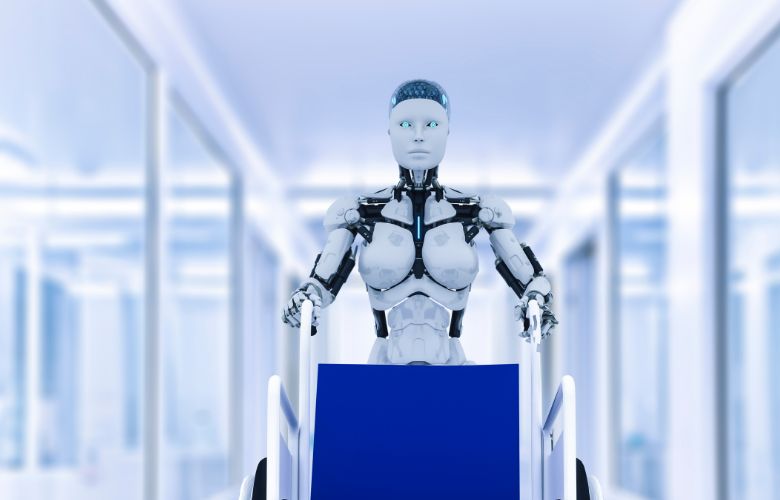In the rapidly evolving landscape of the hospitality industry, staying competitive and providing exceptional guest experiences are paramount. One of the most transformative technologies making waves in this sector is artificial intelligence AI in the Hospitality Industry. Leveraging AI can help hotels, restaurants, and other businesses in the hospitality sector enhance operational efficiency, personalize guest interactions, and improve overall customer satisfaction.

Contents
Understanding AI in the Hospitality Industry
Before delving into specific applications, let’s first grasp what artificial intelligence entails within the context of the hospitality industry. AI refers to the simulation of human intelligence processes by machines, primarily computer systems. These processes include learning, reasoning, problem-solving, and decision-making. In hospitality, AI systems use data and algorithms to automate tasks, make predictions, and provide personalized services.
Benefits of Using AI in Hospitality
- Improved Operational Efficiency: One of the primary advantages of AI in hospitality is its ability to streamline operations. AI-driven systems can optimize staff schedules, manage inventory, and automate routine tasks such as check-ins and check-outs.
- Enhanced Personalization: AI enables businesses to tailor guest experiences. By analyzing guest data, AI systems can recommend personalized services, such as room preferences, dining options, and entertainment choices.
- Cost Reduction: Automation of tasks through AI can lead to significant cost savings. For example, chatbots can handle customer inquiries 24/7, reducing the need for round-the-clock customer support staff.
- Data-Driven Insights: AI can analyze large volumes of data to provide valuable insights. This helps businesses make data-driven decisions, refine their strategies, and adapt to changing market conditions.
- Improved Guest Satisfaction: By offering personalized experiences and quicker services, AI can boost guest satisfaction and loyalty, leading to positive reviews and repeat business.
Now, let’s explore some specific ways AI is transforming the hospitality industry.

Streamlining Operations
Efficient operations are the backbone of any successful hospitality business. AI can play a pivotal role in optimizing various aspects of operations, leading to improved productivity and cost savings.
1. Inventory Management
Effective inventory management is crucial for hotels and restaurants to avoid overstocking or running out of essential supplies. AI-powered inventory management systems can track inventory levels in real-time and even predict demand based on historical data. This ensures that businesses maintain optimal stock levels, reducing wastage and costs.
2. Predictive Maintenance
For hotels with on-site facilities such as spas or fitness centers, AI can predict when equipment is likely to fail and schedule maintenance before breakdowns occur. This proactive approach minimizes disruptions for guests and saves on maintenance costs in the long run.
3. Optimizing Staff Schedules
AI algorithms can analyze historical booking data and predict peak occupancy periods. With this information, businesses can schedule staff more efficiently, ensuring that they have the right number of employees on duty during busy times and avoiding overstaffing during quieter periods.
Enhancing Guest Services
AI can revolutionize the guest experience by providing personalized services and improving communication between guests and staff.
1. Chatbots and Virtual Assistants
Chatbots and virtual assistants powered by AI can provide 24/7 customer support, answering common questions and handling reservations. These AI-driven bots can provide quick and accurate responses, improving guest satisfaction and reducing the workload on human staff.
2. Room Customization
AI can enable guests to personalize their rooms. For instance, guests can use voice-activated assistants like Amazon’s Alexa or Google Home to control lighting, temperature, and entertainment systems in their rooms.
3. Recommendation Engines
By analyzing guest preferences and behavior, AI can make tailored recommendations for dining options, local attractions, and activities. This enhances the overall guest experience and encourages guests to explore more of what the property and its surroundings have to offer.
Marketing and Guest Engagement
AI can also play a pivotal role in marketing and guest engagement strategies within the hospitality industry.
1. Data-Driven Marketing
AI can analyze guest data to create highly targeted marketing campaigns. By understanding guest preferences and behaviors, businesses can send personalized offers and promotions, increasing the likelihood of conversion.
2. Social Media Monitoring
AI tools can monitor social media platforms for mentions of the business and gather insights into guest sentiment. This allows businesses to respond to customer feedback promptly and address concerns, improving their online reputation.
3. Price Optimization
AI algorithms can adjust room rates and dining prices based on demand, competitor pricing, and historical data. This dynamic pricing strategy ensures that businesses maximize revenue without overcharging guests or underpricing their services.
Safety and Security
Ensuring the safety and security of guests and staff is of paramount importance in the hospitality industry. AI can help in various ways:
1. Facial Recognition
Hotels can use facial recognition technology for enhanced security. Guests can check in and access their rooms without traditional keys or keycards, reducing the risk of unauthorized entry.
2. Predictive Analytics for Security
AI can analyze security camera footage to detect unusual or suspicious behavior. This proactive approach can help prevent incidents before they escalate.
Future Trends in AI for Hospitality
As technology continues to evolve, the hospitality industry can expect further advancements in AI applications:
1. Voice-Activated Services
Voice-activated assistants like Alexa and Siri are becoming increasingly integrated into hospitality settings. In the future, guests may be able to control various aspects of their stay using voice commands.
2. Robotic Assistance
Robots are being used for tasks such as room service and cleaning in some hotels. These robots can deliver items to guest rooms and perform housekeeping tasks efficiently.
3. AI in Food Service
Restaurants are incorporating AI for menu recommendations and optimizing kitchen operations. AI can also be used to enhance the dining experience through personalized menus and interactive ordering systems.
Challenges and Considerations
While AI offers numerous benefits to the hospitality industry, there are challenges and considerations to keep in mind:
1. Data Privacy
Collecting and analyzing guest data raises privacy concerns. It’s essential for businesses to be transparent about their data practices and comply with data protection regulations.
2. Integration Costs
Implementing AI systems can be costly. Businesses need to assess the return on investment and budget accordingly.
3. Staff Training
Training staff to use AI systems effectively is crucial. This ensures that employees can provide seamless guest experiences and troubleshoot any issues that may arise.
Conclusion
Artificial intelligence is reshaping the hospitality industry, offering numerous opportunities for businesses to enhance operational efficiency, personalize guest experiences, and improve overall customer satisfaction. By leveraging AI-powered solutions, hotels, restaurants, and other hospitality establishments can stay competitive in an ever-changing market and provide the level of service that modern travelers expect. As technology continues to advance, the hospitality industry should embrace the potential of AI to create more memorable and seamless guest experiences.






